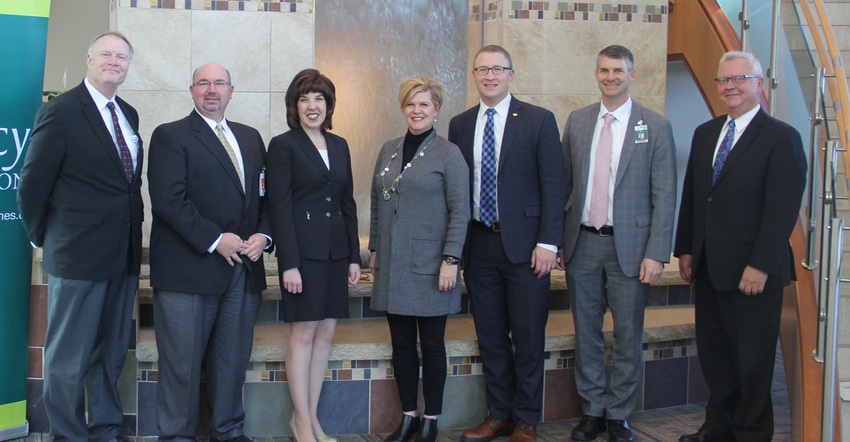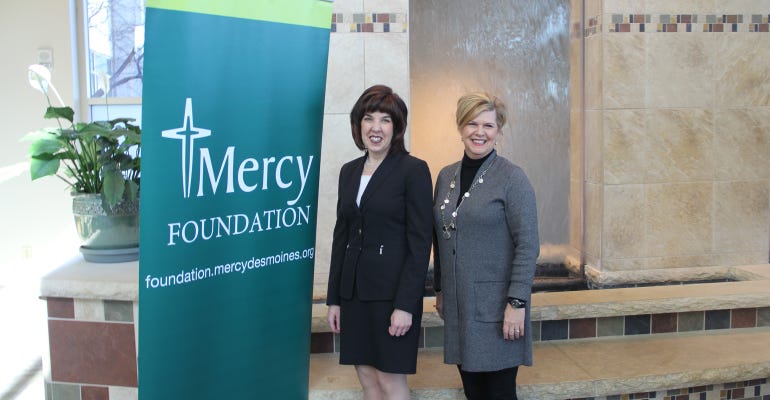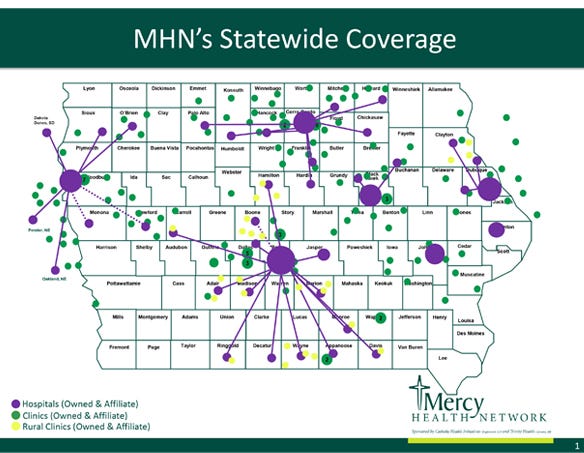December 19, 2018

USDA funding is helping expand education opportunities and telehealth services to rural Iowans. Anne Hazlett, assistant to the secretary for Rural Development at USDA, recently visited Mercy Medical Center in Des Moines, Iowa, to meet with Mercy Health Network leadership. They reviewed the progress and various ways that money is being put to work.
In October, USDA Rural Development awarded nearly $1.5 million in distance learning and telemedicine grants to five projects assisting more than 60,000 rural Iowans, including Mercy Health Network, which created the first telemedicine system in Iowa in 1993.
Projects recently receiving funding in 2018 included:
• Iowa Lakes Community College in Estherville received a $499,975 grant to upgrade distance learning telecommunications equipment at four college campus sites in Emmet, Palo Alto, Kossuth and Clay counties.
• Iowa Specialty Hospital in Clarion received a $52,170 grant to purchase and install telemedicine equipment to connect health care providers at five sites in Wright, Dallas and Hancock counties.
• Westwood Community School District in Sloan received a $499,733 grant to provide a distance learning network that will offer educational opportunities.
• Clarke County Hospital in Osceola received a $314,743 grant to upgrade and extend the video distance learning network in southern Iowa to support the hospital’s efforts to address childhood trauma.
• Mercy Foundation of Des Moines received a $92,826 grant to assist Mercy Health Network in purchasing and installing interactive telemedicine equipment to assist two high-need specialties, cardiology and psychiatry, as well as opioid education.
Connecting rural areas to services
Mercy Health Network uses high-speed connectivity to link more than 40 hospitals in delivering electronic educational programs, conferencing and clinical services. This USDA-funded project will help implement a telehealth network at nine healthcare facilities in Albia, Bloomfield, Centerville, Corydon, Elkader, Greenfield, Leon, Manning and Mount Ayr. The project will serve more than 6,000 rural patients annually in communities that range in populations from 1,200 to 5,500.

MEETING THE NEED: Anne Hazlett (left), USDA assistant to the secretary for Rural Development, and Shannon Cofield, president of Mercy Foundation of Des Moines, led the discussion regarding the ongoing expansion of health services to rural Iowa.

“Getting more rural communities connected to these type of telehealth services is a top priority for this administration,” Hazlett says. “Expanding access to services for quality-of-life improvements and economic development is critical to rural prosperity. Distance learning and telemedicine technology help bridge the gap to our rural areas.”
Expanding telehealth services to connect specialists to rural affiliate hospitals increases the opportunity for rural Iowans to receive specialty care near their homes.
“Having fast and easy access to specialists in rural communities can be a challenge,” says Mike Trachta, vice president for network affiliates with Mercy Health Network. “The ongoing physician shortage in Iowa, and specifically in rural Iowa, means we have to look at new and alternate ways of providing services to our patients who live outside metropolitan areas.”
Meeting needs of more rural residents
Developing new cardiology services through telehealth has been something Mercy Health Network and the Iowa Heart Center have been considering for a while.
“Telemedicine will allow us to bring more outreach programs and technologically advanced treatments and therapies to our rural patients,” says Sam Ayres, market director for administrative operations, Iowa Heart Center. “There were more than 3,000 patient visits last year in the facilities receiving this USDA grant. With telehealth technology, we can serve many more patients in these underserved areas as travel time for the cardiologists and staff is reduced.”
Mercy Health Network takes a three-pronged approach to its telehealth and telemedicine program focusing on education and outreach, clinical treatments, and administrative functions. One of the education components is helping physicians address pain-management issues with their patients, including the misuse of opioids.
“We are contacted on a regular basis from rural providers asking for assistance with opioid-related patient visits,” says Joan Beard, director of the Mercy Pain Center and Palliative Care. “There are many opportunities for new telehealth services as we look at our pain management programs. Keeping patients close to their homes, rather than traveling to us, is an important aspect of patient care.”
Providing medical records, monitoring
Having the proper infrastructure in place in rural communities is key to a successful telehealth program. Mercy Health Network has worked with each affiliate hospital to ensure the appropriate bandwidth is available at all the sites to connect electronic medical records and use different cardiac monitoring techniques.

RURAL REACH: Mercy Health Network, established in 1993, has grown to provide a statewide connection with affiliated county hospitals and local clinics.

However, cellular coverage in some parts of rural Iowa remains a challenge as patients sometimes have difficulty transmitting information from their implanted heart-monitoring devices back to their physician.
“We still hear stories where patients have to get in a car and actually drive to the top of a hill, so they can transmit to us routine pacemaker device checks,” Ayres said. “Being able to work with these rural communities to beef up the infrastructure will allow patients to have more convenient access and, in some cases, will be a huge improvement in the type of cardiovascular care we can provide.”
The Mercy Health Network telemedicine program uses interactive video and audio visits using a secure, high-speed connection to link patients to medical professionals in real time. Specialties include radiology, pharmacy, e-emergency, sleep, psychiatry, mental health assessments, stroke, infectious disease, e-long-term care, vascular, dermatology, cardiology, psychiatry and clinical education.
Leach is public information officer with USDA Rural Development in Iowa.
About the Author(s)
You May Also Like




